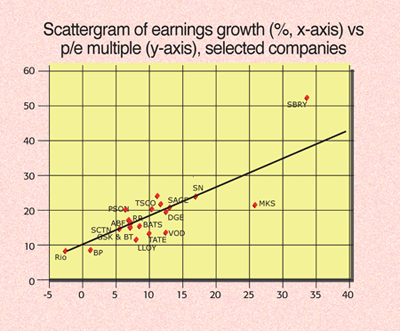Should you buy Lloyds TSB shares?
The market was underwhelmed by recent results from the UK's fifth-largest bank, prompting a sharp fall in Lloyds TSB's share price. But Charlie Gibson thinks this could have been an overreaction.

Get the latest financial news, insights and expert analysis from our award-winning MoneyWeek team, to help you understand what really matters when it comes to your finances.
You are now subscribed
Your newsletter sign-up was successful
Want to add more newsletters?

Twice daily
MoneyWeek
Get the latest financial news, insights and expert analysis from our award-winning MoneyWeek team, to help you understand what really matters when it comes to your finances.

Four times a week
Look After My Bills
Sign up to our free money-saving newsletter, filled with the latest news and expert advice to help you find the best tips and deals for managing your bills. Start saving today!
As Keynes proverbially put it, "The markets can stay irrational for longer than participants can stay solvent". So it's nice to get some evidence of order in the financial world particularly the one we've been living through for the past fortnight.
The chartbelow takes some of the firms I follow and plots their historic p/e multiple against what the City expects their future earnings growth to be.
It was gratifying to find that there was such a strong relationship between the two.
MoneyWeek
Subscribe to MoneyWeek today and get your first six magazine issues absolutely FREE

Sign up to Money Morning
Don't miss the latest investment and personal finances news, market analysis, plus money-saving tips with our free twice-daily newsletter
Don't miss the latest investment and personal finances news, market analysis, plus money-saving tips with our free twice-daily newsletter
In mathematical terms, the correlation is over 0.84 (or 84%). That's very high for something as wilful and unruly as the equity markets.

In crude terms, everything below and to the right of a best-fit' line drawn through the points is cheap or good value, while everything high and to the left is expensive or poor value. Regular readers will notice that most of my buy' tips have been drawn from the lower right portion of the chart and most of the sell' tips from the upper left. Where there are exceptions it's because, although my model uses the data displayed in the chart, there are other important inputs as well. But the chart is a useful device for illustrating the model's conclusions.
It also brings me to the next stock identified by the model as a buy' Lloyds TSB (LLOY). The market was underwhelmed by recent full-year results from the UK's fifth-biggest bank. From a year-high of 622p just before results were announced, Lloyds TSB shares fell sharply to about 540p, which looks like an overreaction to me.
The curious thing is that management put out a statement in December saying that results would be in line with market hopes, so it seems that investors were betting that Lloyds's management was deliberately low-balling' its figures in order subsequently to beat them (not an uncommon practice). Either way, the consequent move in its share price seems as much a function of the state of communication between Lloyds and the City as anything else.
Certainly, Lloyds's results were unspectacular; after restating the prior year's numbers, underlying earnings per share were up 6%. But there were positive aspects too. Costs were kept rigidly in check: the benefits of the bank's various efficiency initiatives were worth £142m in 2005 and are expected to be worth as much as £250m in 2008; there is evidence of stabilisation in customer bankruptcies; the bank's pension deficit improved by a third; and there was a good performance by its investment and insurance arms. Its focus on bancassurance makes Lloyds the most exposed of its peers to investment and insurance business and, although no bank is a good investment if you think the country is heading for recession, this does give it a degree of downside protection in the form of a greater proportion of annuity-like revenue streams.
But perhaps most interesting was group chief executive Eric Daniels's remark that Lloyds is capable of sustained double-digit economic profit over time'. Chief executives do not make such predictions lightly. Moreover, analysts broadly concur with this view, expecting Lloyds to deliver earnings growth of about 8% in 2007 and 9.3% in 2008. That may seem unexciting, but it's much better than the stagnation of most of the past decade.
Historically, the banking sector has been a rollercoaster, with wonderful performance in good times matched by appalling losses and write-offs during bad patches. As a result, the market tends to undervalue banks. Even so, Lloyds now looks too cheap. Applying my model to the old analysts' numbers suggests that Lloyds is a buy at 568p and a sell at 645p. Applying it to the upgraded numbers indicates that it is a buy up to 581p and a sell at 658p, with a potential upside of up to 30% and a potential downside limited to no more than 8%.
Of course, investors should bail out quickly if they see any chance of an economic downturn. In the absence of that, however, and currently yielding over 6% apparently safely Lloyds looks to me like a good bet.
Finally, a word on Rio Tinto (RIO). Like all of the miners, Rio was knocked pretty heavily in the last few days due to fears that a slowdown in the Chinese economy would affect its uptake of base metals, which would inevitably feed through to base metals' prices on Western markets.
Whatever the fears, however, it is worth noting that while equity markets shivered, there were no such anxieties in the base metals' markets themselves, with both copper and aluminium holding up nicely. As such, there has been no evidence of any downgrades of Rio's earnings expectations (if anything, the reverse appears to be the case) and, for that reason, Rio continues to remain a buy in the absence of any other factors.
Charlie Gibson is an analyst and private investor
Get the latest financial news, insights and expert analysis from our award-winning MoneyWeek team, to help you understand what really matters when it comes to your finances.
Charles has previously written for the MoneyWeek, giving readers his share tips regularly and covering other topics on the side such as stock markets and the economy. He has also written for The Business, Shares, Investors Chronicle and The Evening Standard, and Charles has presented on LBC and been a guest on BBC One and BBC World. Aside from his journalist background, Charles graduated as a chemist from the University of Oxford specialising in ligand gated ion channels.
-
 Should you buy an active ETF?
Should you buy an active ETF?ETFs are often mischaracterised as passive products, but they can be a convenient way to add active management to your portfolio
-
 Power up your pension before 5 April – easy ways to save before the tax year end
Power up your pension before 5 April – easy ways to save before the tax year endWith the end of the tax year looming, pension savers currently have a window to review and maximise what’s going into their retirement funds – we look at how
